Former Cordaid employee Othman Khalil shares an inside story of Mosul, Iraq’s second-biggest city. Othman grew up in the city during the Iraq War and survived the occupation by ISIS. In love with his maimed city, he began humanitarian work right after the liberation battle—and he hasn’t stopped since.
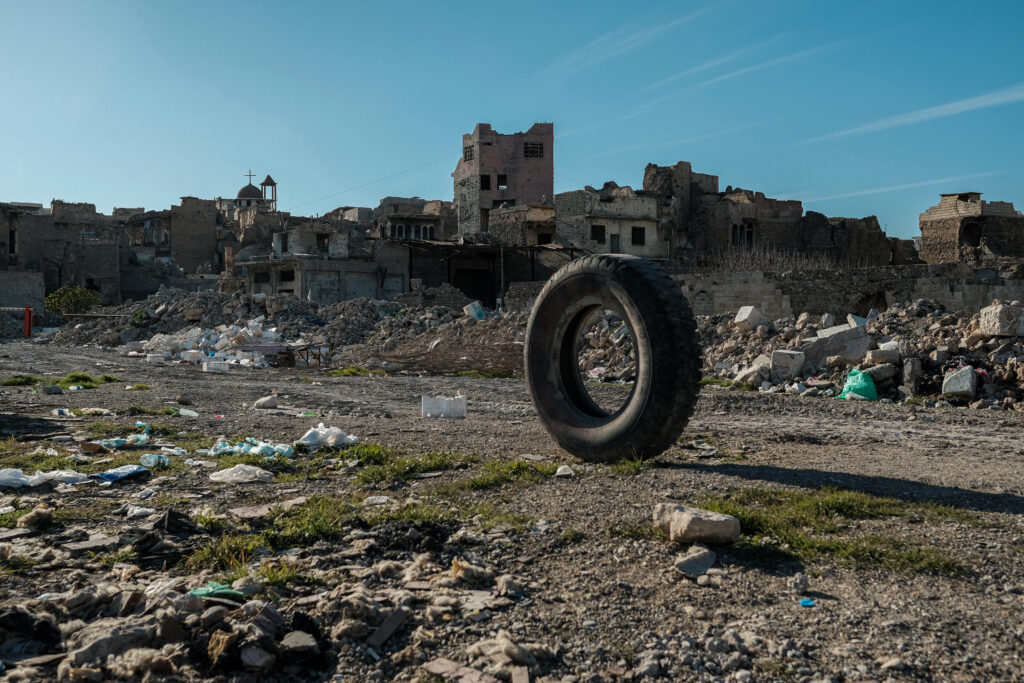
His story starts right after 2003, when, still a child, a US-led invasion launched the Iraq War and set in motion wheels of power that would wreak utter fear and destruction over the city. Othman has seen the rise of extremism and the take-over of his city by jihadist fighters. He was a young man during the Battle of Mosul, the retaking of the city from ISIS’s clutch in 2016 and 2017. It was the largest urban conflict since World War II.
That battle liberated the Maslawis, as Mosul’s citizens are known. But three-quarters of their houses and buildings were damaged or destroyed. They were free to live and to grieve their dead in a pile of rubble. Free to start from scratch.
‘The squirrels’
As free as it gets, that is, with the traumas they carry. The armed militias that rose to power after the liberation are now surveying city life. With the checkpoints. With ISIS cells still carrying out attacks and neighbouring countries pulling a lot of strings. For Maslawis, freedom is a relative thing.
The majority of them are Sunni Muslim families. Stigma, for having lived and survived in Mosul under Sunni ISIS rule, clings to them. Years after the liberation battle, they still grapple with a bad reputation outside Mosul. It robs them of opportunities and a fair chance to move on.
‘We’re used to setbacks’, they say. Maslawis are known as ‘the squirrels’, always stockpiling stuff for survival, preparing for sieges and sanctions. It has become a habit these past centuries since ill-intentioned outsiders decided to honour their city with a visit or a somewhat longer stay. The Mongols, the Ottomans, Saddam’s troops and informants, and, more recently, US troops and Islamic State fighters.
Then and now
The crazy thing is they do start from scratch, again and again. When we visited the old city in 2019, it was still a place of ghosts. Silence permeated the marrow through to the bone. The market consisted only of one man and his melons, selling nothing to no one. When we were there in February 2023, welcomed and taken on a tour downtown by Othman Khalil, the same market area was buzzing and bustling, hooting, coughing and laughing like a souk should, offering coffee, tea and good food, car and shisha fumes aplenty. The clothes were colourful. There were sounds of music. Men slipped their way through narrow sidewalks full of stands. Women, too, are faced. Under ISIS, that would have been like walking on the moon. The city was alive.
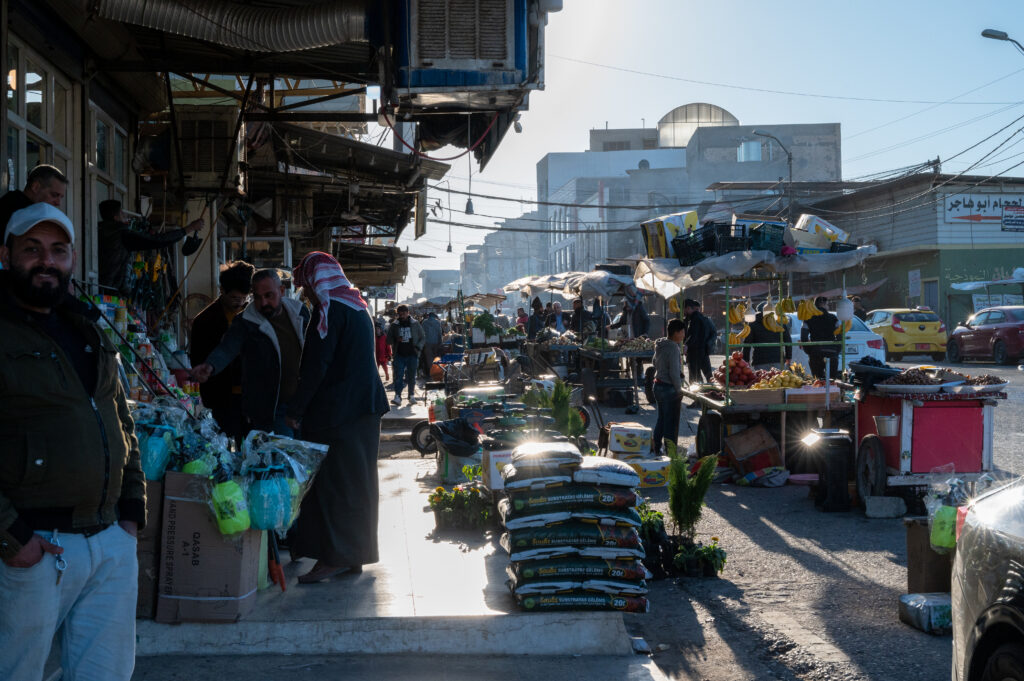
First-hand answers
How did people cope and survive under ISIS? What was the effect of military operations concocted thousands of miles away on families, mothers, and kids? And above all, how did the city start rising out of its ashes? Othman, a born Maslawi who worked with Cordaid for several years, knows the answers to these questions first-hand.
As a young boy, he saw the US troops and the green light from their laser guns. When ISIS came, and life froze, he was about to start university. Nearly four years later, he survived the liberation battle by hiding with his family for hours on end while one house after another in his street was blown to smithereens.
The university of life
Then, instead of graduating from university, he turned himself into a humanitarian professional. First, he did paramedical ambulance work, taking care of the dead, the dying, and the wounded. Then, after the immediate emergency phase, he joined international agencies, including Cordaid, and got involved in youth employment and business development programmes in Hawija and the Mosul area.
Over the years, he and his colleague aid workers supported hundreds of farmers, business owners and young graduates in pursuing their ambitions and starting a new journey, individually and collectively, as citizens of the same city.
“Moving on after the horrors and the destruction starts with having an income and employment. This is about much more than money,” he says. “Business brings movement and interaction between people who were isolated, divided and crippled by terror for years. It allows people to send their kids to school again. It brings health to body and brain.”
A tribute to many
Othman shared his story one February morning in the cosy corner of a coffee & bookshop in Al Majmooah, Mosul’s university neighbourhood. “If I had done this interview in the days of ISIS,” he said, “they would have killed me on the spot.”
Essentially, Othman’s story could be that of many of Cordaid’s staff. Our work, operations, and responses are planned and carried out by professionals living the realities of conflict and insecurity daily. They often come from crisis areas, such as Yemen, Eastern DRC, South Sudan, Afghanistan, or other places. They are Cordaid’s backbone and nerves, our brains, heart, and muscles. Othman’s story is, therefore, also a tribute to them.
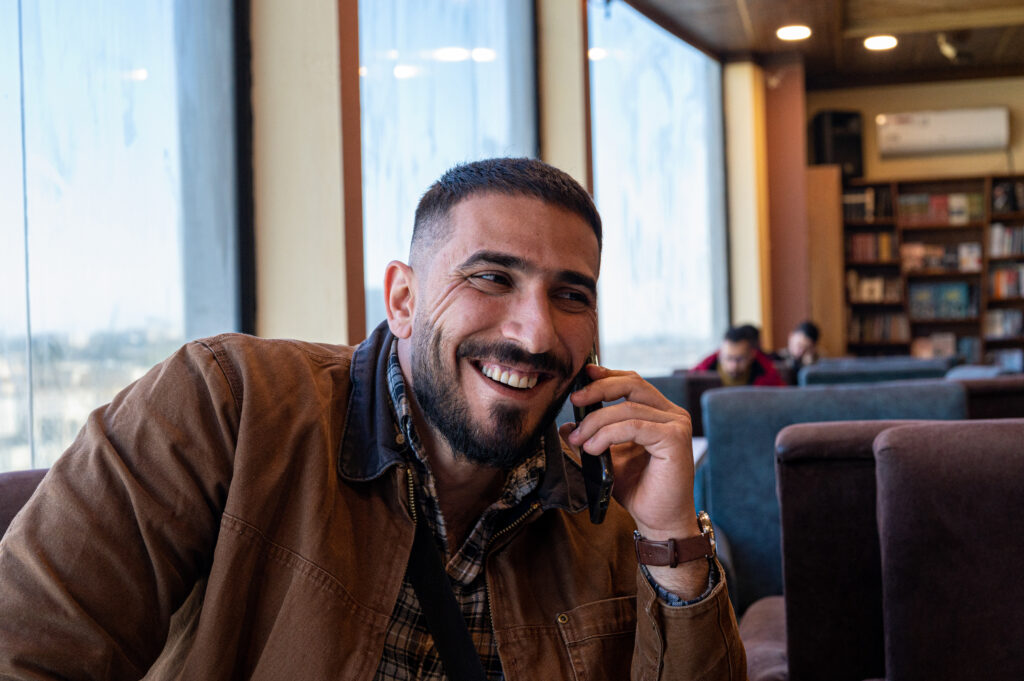
“I was born in Mosul on August 27 1995, in a hospital near the bookshop we sit in. It was during the war with Iran that Saddam ruled the country, and international sanctions crippled our economy.
My parents were government employees, but their combined income wasn’t enough to feed me properly. We mostly ate rice, so I was very skinny as a baby and as a child. Later, I made up for it with bodybuilding.
Even though we were poor, I have fond childhood memories. The city was clean, and life was clear. People knew where they were heading and what turns to take. I went to school, did what boys do, and grew up with my brother and sisters. Life felt safe.
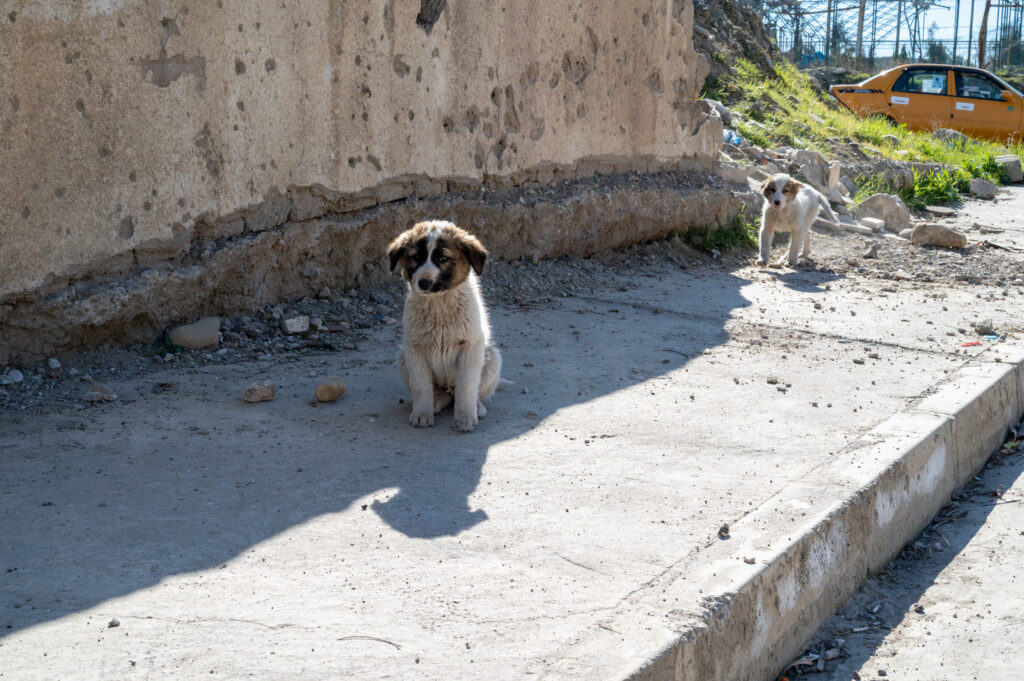
Back then, you could approach and even cuddle a cat or dog in the street. That’s impossible today; they have all gone wild and are terrified of people.
Rock, paper, scissors
Things changed after 2005. By then, the US invasion of Iraq, which had started in 2003, had reached Mosul. I remember seeing the Americans for the first time—their equipment, the night vision kits, the green lasers. They were mostly near banks and other important buildings, not in the smaller streets. When you saw them, you knew you couldn’t run. Any sudden movement could get you into trouble, so we just froze.
Once, this American soldier started talking to us. He wanted to play rock-paper-scissors with me, and my mother tried to translate what he said. She probably got it wrong, but she said that if I lost, he would cut my finger. She really believed that and so did I. I refused to play. It was my first interaction with a US soldier. The memory still scares me today.
Then came the raids, the clashes. They came in waves. I remember my mom and I were walking to the bakery. It was next to the governorate building. The streets were empty, and things felt weird. Suddenly, these desert sand-coloured Humvees appear. The moment US troops spotted us, they loaded their guns. This time, my mother said we had to hide, and we ran into small alleys and hid. And then I heard, for the first time, bullets spinning through the air near us. A sharp whistling sound.
“It was my first interaction with a US soldier. The memory still scares me today.”
From then onwards, all memories I have of the Americans have to do with either bombs or armed clashes. I saw the raids, the helmets, the green lasers going in all directions. Even inside our own house. We were petrified. I was a young kid.
A common enemy
In Mosul, Sunnis are the majority, but there are many ethnic-religious groups. Back then, we all lived together and supported each other: Sunni families, Shia, Kurds, and Yazidis. There were no real boundaries. In fact, among my close friends at the time, there were two boys, one Shia and one Yazidi. All parts of society supported each other in schools and during events.
This feeling of unity and solidarity only grew stronger when the Americans came. We had a common enemy because their bombs hurt all of us.
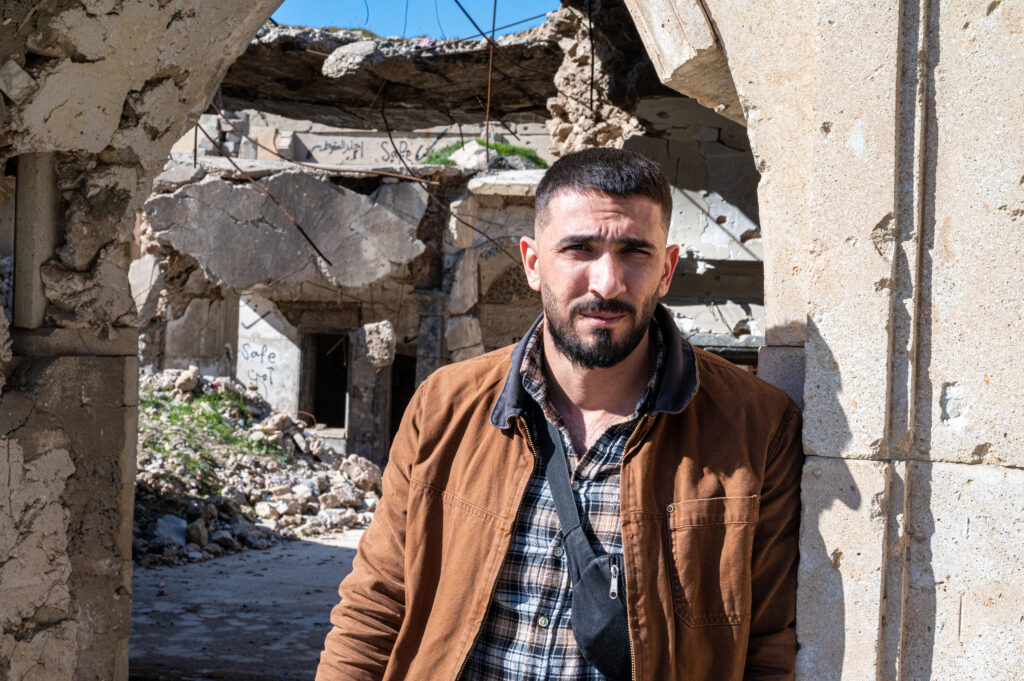
Of course, there was armed resistance. When Mosul is attacked, as it has been for centuries, we fight back. I was too young to fight. Besides, I had different dreams of becoming a doctor or an engineer. But the armed resistance was there, and it would only grow.
In 2006, things took a bad turn. On television, people had seen the pictures taken in Abu Ghraib prison of American soldiers torturing Iraqi prisoners of war. We saw the ugly faces of those who fought us. After this, men started joining the armed resistance in bigger numbers. Later, we found out that people around me, including older friends, had also joined.
Underground resistance groups have always existed in Mosul. Under Saddam’s dictatorship and before that time. But now, they suddenly started finding the kind of community support they had never had before. There was no talk of Al Qaida or ISIS yet; they were only known as ‘resistance’. Suicide attacks against US and coalition targets, ambushes, the use of improvised explosive devices… All that took a crazy flight.
Weird pressure
Then, gradually, these resistance fighters started claiming they represented true Islam. The fighters had become Islamic fighters. There were the Sunni fighters that would later be called Al Qaida, with a lot of foreigners and with a focus on Syria, and those that would become ISIS, mostly Iraqis that had their eyes on Iraq. But they collaborated; this was before they took separate ways. There was also the Shia resistance, which eventually became the umbrella of militias known as the Popular Mobilisation Forces, now part of the formal power structures.
By now, I was twelve. There was a weird pressure on boys my age to join the armed Islamic resistance. They don’t just say, ‘Hi, Othman, you’re a good boy, come and join us’. No, first they come and invite you to play football. Then, they ask you to attend a club in the mosque. There, they start feeding you with ideas of who is bad and who is good. They use religion as a game to drug your mind. Later, recruitment tactics became rougher. They would hand out DVDs in schools, showing video clips of attacks and killings. And after the Sunni fighters, by then known as ISIS, had taken the city in 2014, their tactics of persuasion would become pure evil, as we would find out.
“We were divided. It was heart breaking.”
I don’t know why, but I didn’t yield to the pressure in the mosque, on the football pitch, at school. Maybe because I was still too young. My parents were neutral. They thought both parties were bad, the armed fighters and the US who had invaded us.
Everyone was confused, trying to make sense of what was going on. No one knew what was happening or how things would evolve. The worst was when we started not knowing who was good or bad. Suspicion and fear crept into all of us. My parents forbade me from meeting and hanging out with my three close friends. We were divided. It was heartbreaking.
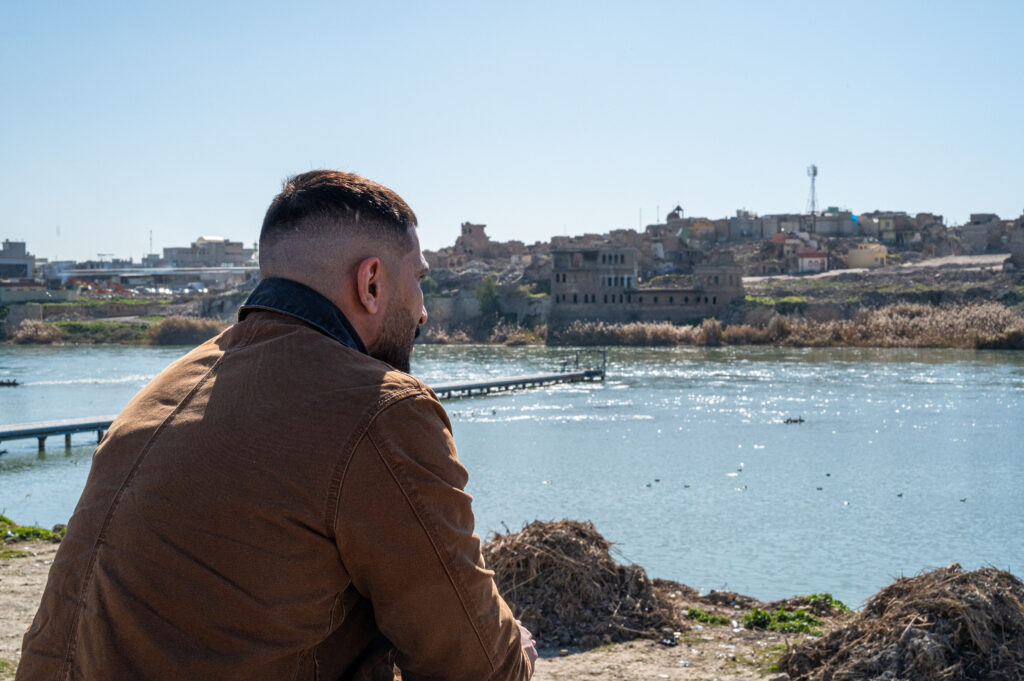
Masterminds of violence
Saddam was Sunni, and ISIS claimed to be Sunni. So whenever US troops encountered problems, they targeted and profiled the Sunni population. This only fanned support for the Islamic fighters. It had a spiralling effect, which was exactly what the masterminds of violence, the US, as well as the jihadist extremists, wanted. More and more innocent young men were arrested in raids and taken to US prisons. Here, they were brutally confronted with other inmates and with the extremism of Salafist ideology.
“Imprisonment was a form of recruitment. The US military knew this. In fact, they facilitated it.”
Someone I knew who had spent time inside once told me that if you try to stay neutral in prison, you get harassed and beaten continuously. If you yield and join the extremists, they promise you protection and a lot of advantages for family members. Imprisonment was a form of recruitment. The US military knew this. In fact, they facilitated it. Because they thrived on instability. It allowed them to tighten their grip on the Middle East.
By 2007, every couple of months, there were big waves of targeted killings. By the resistance, the Islamic fighters, the US and others. Any public figure, anyone from the government who could become too popular or influential, was killed. This continued, to a lesser degree, until the day ISIS conquered the city in June 2014. Even my dad, a simple government official, received threats. Luckily, he wasn’t a big shot.
Enemies of each other
So, by now, the resistance, just like the US, is showing its true, ugly face. The solidarity we all felt in 2005 of having a common enemy is gone. Instead, we were being divided, and we found ourselves being enemies of each other: Sunni, Shia, Kurdish, Christians, and Yazidis.
By then, family life, and life in general, was governed by one rule: stay inside, don’t go out. I continued going to school in those years, but only because there was a school very near our house.
Between 2010 and 2013, there was a short period of relative stability. Saddam was dead, US troops had retreated, international attention had shifted from Iraq to the war in Syria, and ISIS had not yet started its military offensive to capture our city. Prime Minister Al Maliki headed the government. Later, he would be the one to order the army to withdraw from the city, allowing ISIS to take over. But before that, for a while, he did a good job. The world was recovering from a global financial crisis, and Iraq’s oil trade and income fared well. We could feel this in Mosul. It felt as if we could breathe a little bit.
Caught in crossfire
But my city had changed completely. Before the age of ten, I had never seen a checkpoint in my life. Now, at age 16, there were checkpoints everywhere. Military watchtowers were checking our every step. I was hardly allowed to go out; my parents were too afraid. They did everything to keep all of us alive. We had lost a relative, a cousin who was deaf. He hadn’t heard the warnings and was caught in the crossfire. When I was a kid, he made toy ships for me made from pieces of wood.
“We had lost a relative, a cousin who was deaf. He hadn’t heard the warnings and was caught in crossfire.”
So far, my immediate family and I have all survived. But life as we knew it was gone. And the worst was only to come.
Sometimes, people say ISIS was born in Mosul. It’s not true. They started in the desert areas, far outside the city. From there, they moved around freely between Iraq, Syria, Jordan, and Saudi Arabia, recruiting their fighters and preparing their attacks. Their leader, Al Baghdadi, had spent time in an American prison in Iraq. This is how he started rising to fame.
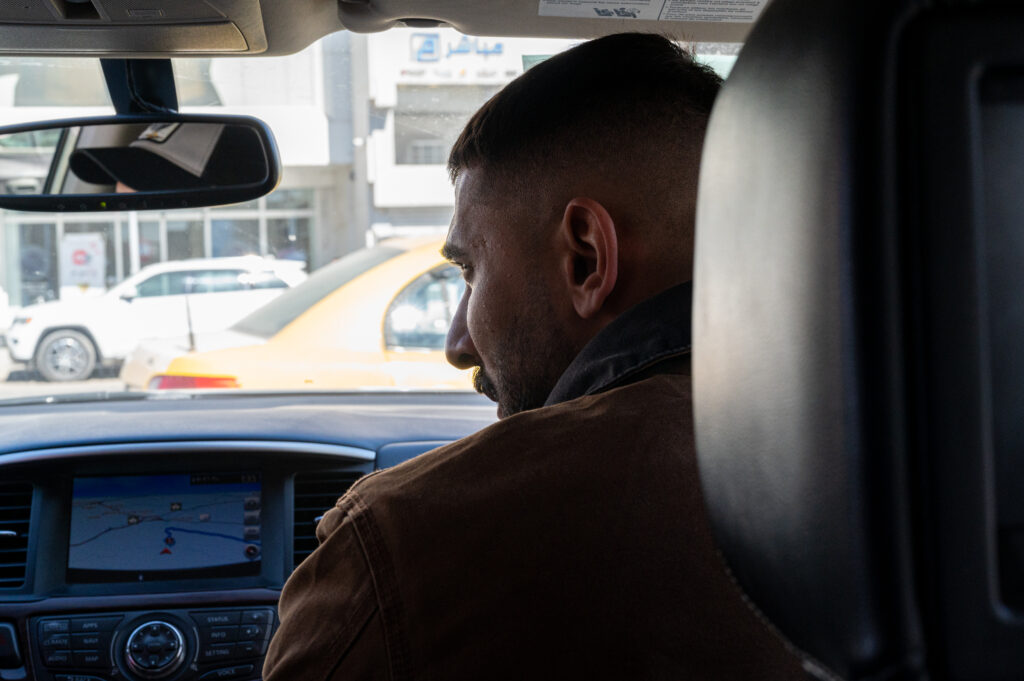
By early 2014, targeted jihadist attacks inside the city increased in number and extremist groups controlled parts of Mosul part of the time. Then, one day in June, three hundred ISIS fighters entered Mosul. World media exaggerated things, saying there were thousands of them, making them bigger than they actually were. But three hundred is already a nightmare! You cannot imagine what only one armed extremist can do in a city. Let alone three hundred. Within a week, on June 14, they had conquered Mosul. We all knew this was more than just another wave of killings. This time, the city was lost.
Three hundred vs. seventeen thousand
How can three hundred fighters conquer a city of millions, defended by over seventeen thousand Iraqi soldiers? If every soldier had only shot one bullet, the jihadists would not have stood a chance. But Iraqi soldiers came from completely different areas, making them less intrinsically motivated to defend a city that wasn’t theirs. And ISIS fighters were extremely scary, apt to do anything, anytime, from using chemical weapons to suicide attacks. They chose to take Mosul because they knew that the Sunni population had been underserved for decades and were traumatised by the US raids and attacks. Their resentment, grievances and frustrations made them lean more towards armed, fellow Sunnis who, in the beginning, claimed they would support them and do them justice.
“Mosul fell after only a week.”
Besides all this, many hidden national and international political agendas had something to gain from the quick collapse of our city. And collapse it did. Mosul fell after only a week.
Life stops
I was 19 and about to start my first year of mechanical engineering at university. However, the university was taken over by ISIS. I knew going there would be a waste of time. Degrees would not be accredited by the government in Baghdad. Besides, most of my professors had fled the city. So, I quit my studies.
From the start, I knew ISIS was evil. I did everything I could to avoid them. Like staying inside even more. I even started sleeping during the day, when their fighters and informants could be in the streets, and staying awake at night.
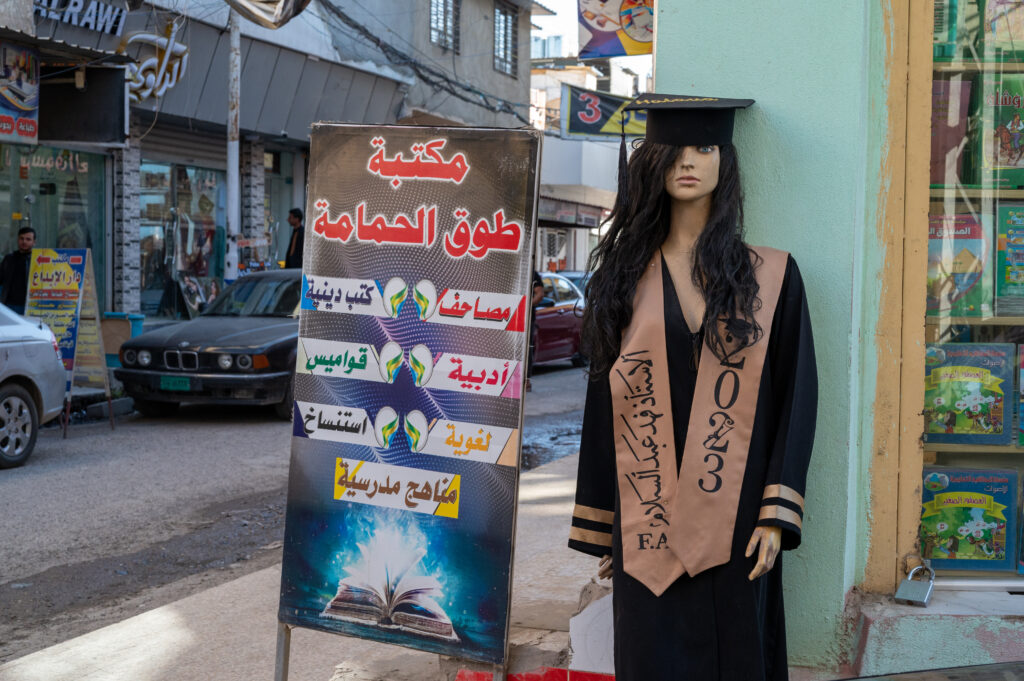
Quickly, the new rulers had sealed off the city. We had considered fleeing as a family, but we didn’t have the means. And there was the insecurity of jumping into the unknown. And the hope that maybe, just maybe, they would only stay for a couple of weeks, like they had done before. So we stayed. And we had to deal with ISIS for almost four years.
The ISIS occupation has been the worst thing in my life. Nothing compares to it. Life is about growing, going forward, moving on. Now, life stopped.
Adapting to the impossible
The city was sealed off, and there was a constant risk and fear of being arrested or being killed for doing the wrong things. We adapted. By no longer shaving and sticking to new dress codes. Our trousers couldn’t cover the ankles. In public places, women had to be fully covered, even the eyes.
“We did go outside, about once a month, to go to the market and buy a stock of essential food items.”
Cell phones were forbidden. First, only the ones with cameras were forbidden, then SIM cards, and finally, cell phones altogether. Music was forbidden. Cigarettes were not allowed. Many men, like myself, were avid smokers. No wonder people secretly started trading these very thin cigarettes that were easy to hide. ISIS has left now, but these thin cigarettes are still around.
We also adapted by staying inside more than we had ever done before. It’s the main reason I was never arrested. We did go outside, about once a month, to the market and buy a stock of essential food items. When passing the ISIS checkpoint, we knew exactly what they liked and disliked, what to say, how to look, and what clothes we had to wear. They didn’t like you to be nice and clean.
Who could you trust?
Every single person lived in fear. ISIS fighters and officials wore uniforms, but their informants and spies didn’t. So, who could you trust? No one. Even young guys I knew had joined them. Not because they wanted to, but because if they didn’t, they’d be killed or one of their relatives.
We heard of people being extorted. They first had to pay sums of money, and then sell their houses, otherwise, they’d be killed. Or they had to pay a ransom to get back relatives who had disappeared. Suddenly, there were hangings and other forms of public executions and punishments. People disappeared. There’s a big crack in a rock just outside the city. A dangerous hole that has been there for ages. In Saddam Hussein’s days, they already wanted to fill it up. Under ISIS, it was one of the places they used as a body dump. The bodies are still in there. It’s too hard to take them out. After the liberation, people started using it as a waste dump.
The killings
How did ISIS impose its rule? Not by going door to door, collecting cell phones, or doing other stuff. They just killed youths who used a phone, wore the wrong clothes, and said the wrong things. Either in the street, on the spot, or in public executions. I have seen many people killed in the street. You couldn’t look at them openly; it was too dangerous. With executions, it was different. If you happened to be near them, often in crowded marketplaces, you were forced by ISIS to watch. Shopkeepers were forced to stop selling during the event.
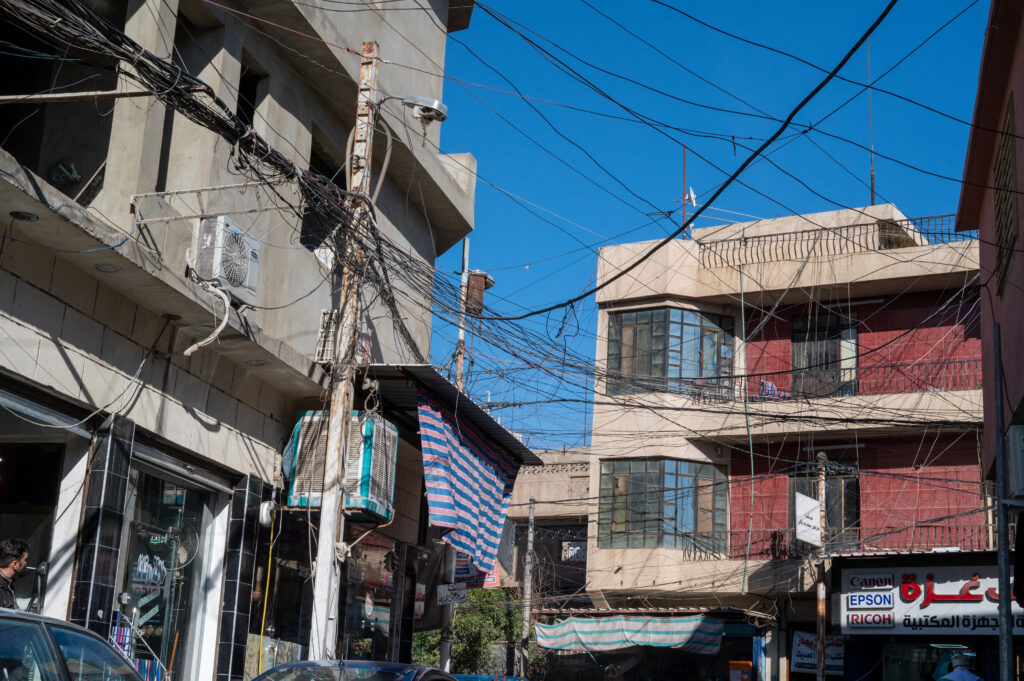
You see that electricity pole out there in the street? On it, like in many other places, they’d hang dead bodies, with a sign saying “a rat”, or “a traitor”. The ways they killed were horrible. People died by hanging, in cages, in pools, and in cars that were shot with rocket-propelled grenades. They were beheaded or killed by electric shock torture. Once, they even let loose a lion in a crowded place. Their sadism had no boundaries. And all these killings were recorded on video and shown in the streets. Everybody saw it, nobody talked about it. We all kept it inside ourselves.
Seeing someone die is very hard. But not being able to do anything to help, soothe or comfort someone who is dying is terrible. They always screamed. The only executed person who died quietly was Saddam Hussein. When they scream for help, it’s bad enough. But what I remember most is those who say goodbye. They bid us farewell, the bystanders, including their family members, wives, and children, who were also forced to attend. If you tried to help, you’d be shot immediately.
“No, not all of us were sheep. Some people did resist and speak out. And almost all of them were women.”
She was a rebel
The fear worked very well. The terror turned us all into sheep. In fact, maybe sheep have more courage than people in Mosul at that time. Unlike the days of 2005, there was no talk whatsoever of resistance or organised opposition. Even at home, we hardly talked about the horrors we all witnessed. My dad did a little bit. He could only keep his job and feed his family by pledging allegiance to the new rulers.
No, not all of us were sheep. Some people did resist and speak out. And almost all of them were women. Mothers. I remember this woman. Her son had been killed for a silly issue, like using his phone. Her grief was such that she couldn’t keep everything inside any longer like most of us did. I still see her shouting in the street, telling ISIS members they weren’t real Muslims but terrorists. Some would say she had collapsed. No, she was a rebel. And she was shot.
ISIS had taken over the public services of the city amazingly fast. They were well organised. Any counter, any city office you sometimes had to go to, was taken over rapidly. Sometimes, you have to go out to get food, to get some kind of stamp, clearance, or certificate. They were everywhere.
Poor guys
They also had a very well-oiled machinery of death. There were centres in town where men were trained to commit suicide attacks. At one point, we knew our neighbour’s place had been taken over and that suicide attackers were trained there. They were drugged. It was frightening, poor guys. Who knows the horrors they were going through, the pressure and torture they had experienced? I hated them, and I pitied them. Young men my age entered and exited the building, completely dazed. The only thing you could do when seeing them was to greet them with a nod furtively. And then, later, you would not see them anymore. We didn’t even talk about this at home. Too dangerous. Too hard.
This was life under ISIS. All my inner standards had changed. Before, not having breakfast was a bad start to the day. Now, spending a day without seeing a killer or seeing someone die was a good day.
We lived like this for three and a half years until October 2016, when the liberation of Mosul started. And it didn’t come lightly.
It is easier to keep an enemy from entering a city than to chase an enemy out again. Especially ISIS. They had hijacked the entire population and used them as human shields throughout the military operations to liberate the city. We lived in the eastern part, where the Battle for Mosul started in October 2016.
If you were lucky, the counterterrorism division would liberate your street or neighbourhood. They were known for being decent with people, and their precision attacks caused fewer casualties. We weren’t lucky. Our liberators, the Iraqi army, weren’t the worst ones; they were somewhere in the middle.
“Sometimes they freaked out. They used mortars randomly.”
Loudspeakers
They came with tanks, big tanks in narrow streets. They knew suicide attacks could happen at any moment and that there could be booby traps anywhere. It made them edgy and irritable towards all citizens. Sometimes, they freaked out. They used mortars randomly.
The day they came, or rather the night, we knew it was the army. Inside our house, in the dark, we heard big loudspeakers on rolling tanks playing the national anthem and popular Iraqi songs—soldiers singing. We knew there was a storm coming—hope, fear.
All together of just a few of us?
Under the staircase was the safest place. It was surrounded by concrete. So that’s where we hid: my parents, my two sisters, me and my two brothers. For hours. We’d have these conversations, debating what was better – dying all together or losing only some of us. We all agreed that dying together was better.
At one point, there was a big blast in our street. It was an ISIS car bomb attack. After a while, we decided to look outside. A house was on fire, and people were inside. ISIS would not allow anyone to help the family get out.
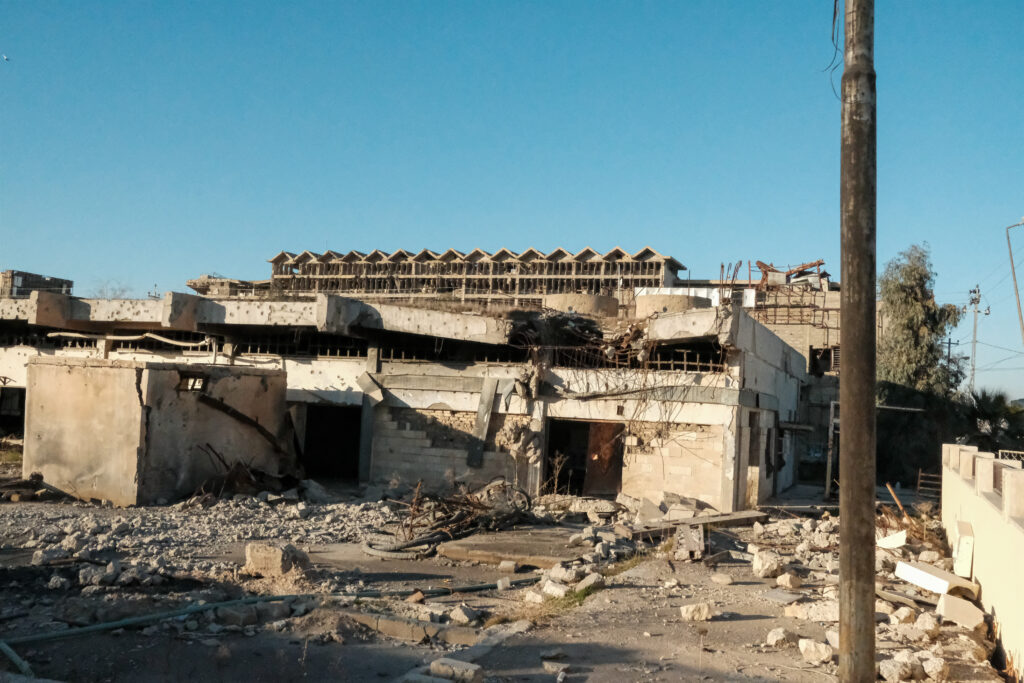
In our street alone, four houses were destroyed during the clashes. All of them were blown up by car bombs and suicide attacks. Each house had at least ten people inside. Explosions had blown away parts of the façade of our house. Big bullets had penetrated the house. There was shrapnel all over. We were lucky to be alive, Alhamdulillah. Hiding under the staircase proved to be a wise decision.
“ISIS would never have knocked, they would have thrown grenades.”
Knocks on the door
In the early morning at four, when things had been calm for a while, there were knocks on our damaged front door. We immediately knew this was the army. ISIS would never have knocked; they would have thrown grenades. My mom and dad both went to open the door, and yes, there were soldiers accompanied by informants. These informants went from house to house with the soldiers. They had briefed the army and cleared our house. We were liberated.
Of course, we were happy. But also extremely worried. Our street was in ruins, and dozens of people, neighbours, had been killed. What about our relatives? Our friends? Under occupation, our mobile phones were confiscated, so there was no way to determine if they were okay. What about our future lives? What about our city?
“It would take another nine months to liberate the rest of Mosul, street by street.”
Soon after the liberation, we cleared the rubble in and outside our house, plastered the bullet holes, and started reconstructing.
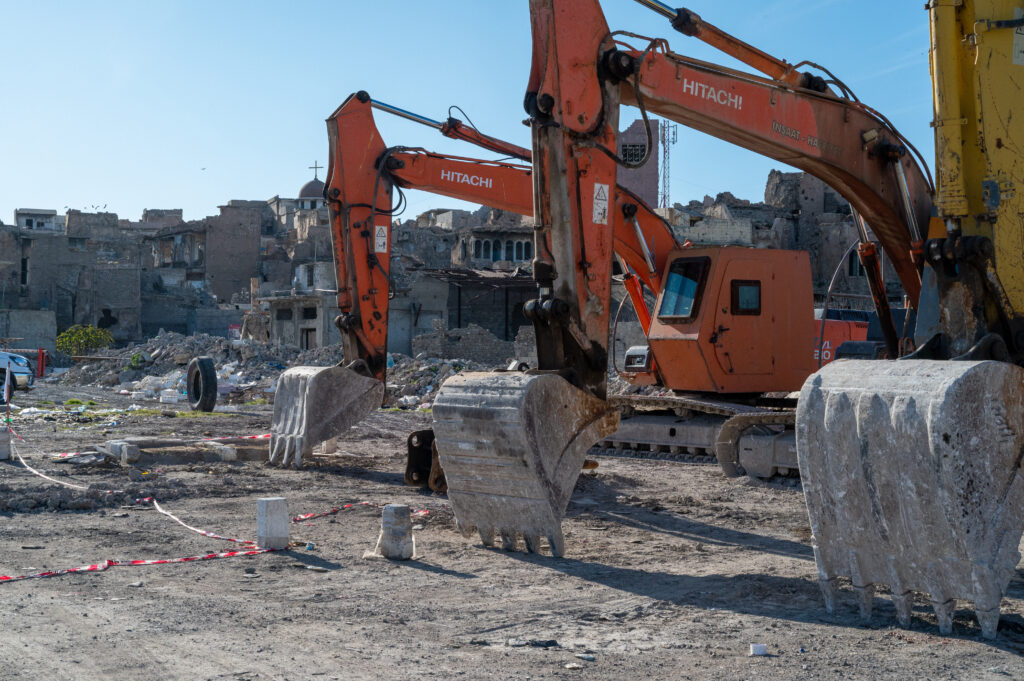
It would take another nine months to liberate the rest of Mosul, street by street. I didn’t know this then, but I would soon find out. My life took a turn I would never have imagined. Before, I couldn’t stand seeing blood, not even a drop. Ultimately, I got to see a lot of it.
Mosul had been besieged, captured, sealed off, liberated, and destroyed. The city was in ruins. People were broken, traumatised, and very suspicious. There was no trust, no cohesion. I was 21, and I didn’t have a degree. What should I do?
“It is my city, and I love my city. I was born here, I live here, and I will die here.”
People sometimes ask me, ‘Why didn’t you leave this hellhole?’ They are wrong. It is not a hellhole. It is my city, and I love it. I was born here, I live here, and I will die here. My heartbeat is connected to this place. Every time I leave the city, I feel uncomfortable.
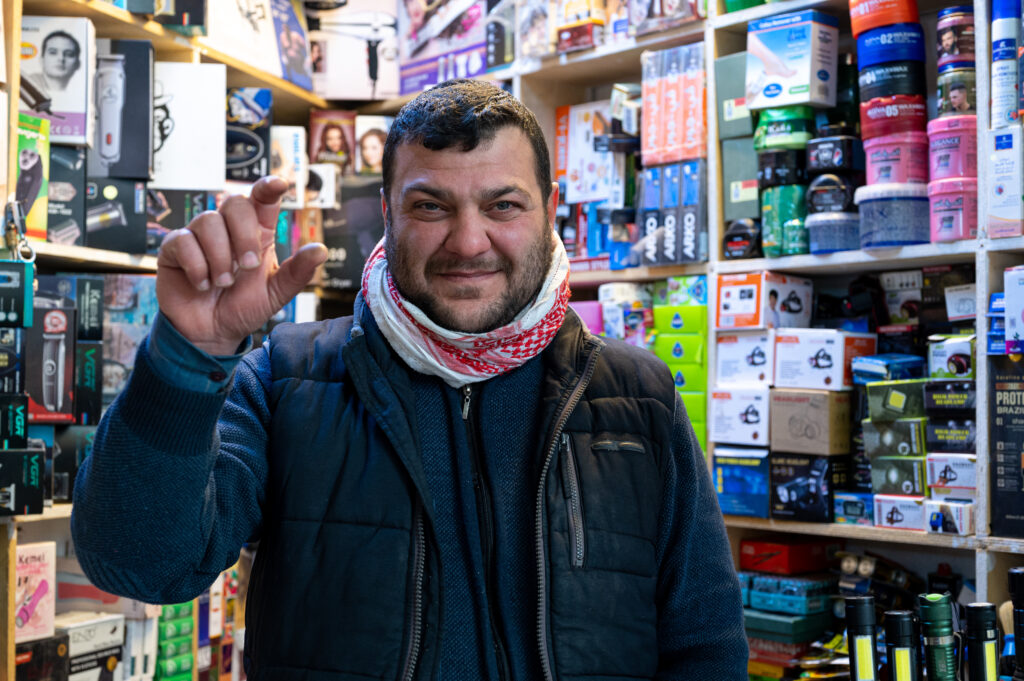
I knew I was always meant to stay. I wanted to help. This might sound noble, but it’s not. It made me feel better about doing my best for others. So, in a sense, it’s also selfish.
Ambulances and checkpoints
I had a friend who worked with a government fast response team, driving an ambulance. I wanted to join them. They screened me, recruited me, and I did a short training. It was voluntary work. So now, my friend and I were following the army during the liberation of the rest of Mosul—not on the frontline, but on the second line, the support line. We did very basic medical things, like providing stability for the patient inside the ambulance and giving first aid.
“As a boy I was afraid of blood. During this ambulance work, I got used to it very quickly.”
We had to take patients to the hospital outside the city. There were many Iraqi army checkpoints on the way. They checked whether patients were ISIS, soldiers, or civilians. We had to tell them what the army had told us when we received the patient. In case they were ISIS, soldiers would take out the patient and kill that person on the spot, male or female. We didn’t know anything about the patients, we didn’t know what was true, we just had to repeat what we had been told.
“We didn’t look”
We tried to save people’s lives, and at the same time, we saw them get shot. There were these ditches near the checkpoints. That is where they shot them. Most of the time, we didn’t look. We heard the screams. It felt terrible. But something inside also neutralised this feeling. ISIS has done so many bad things to us.
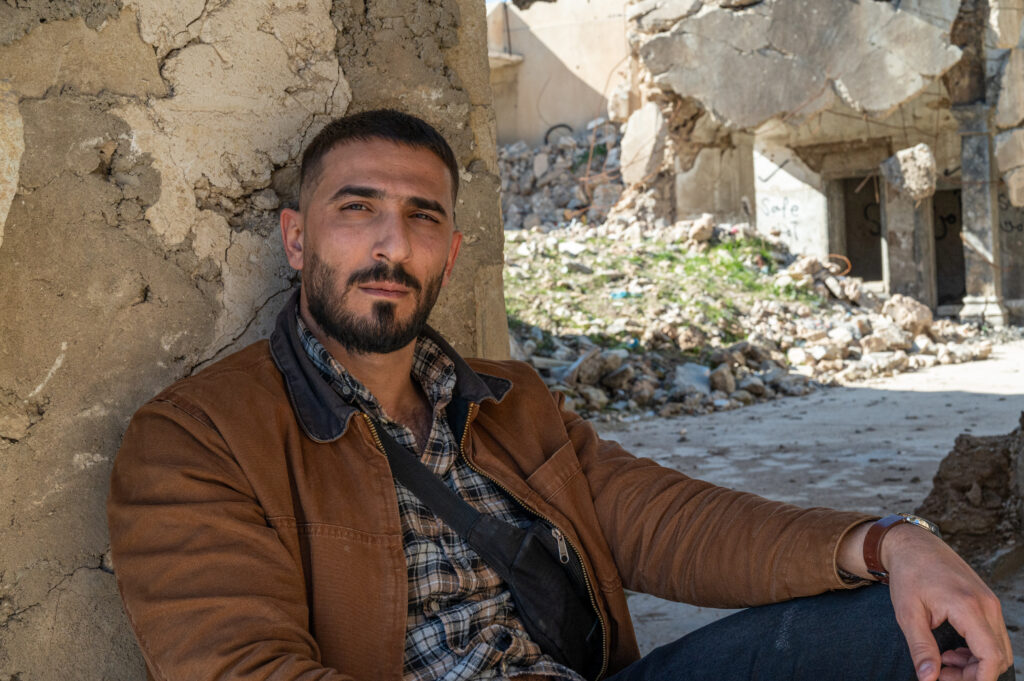
As a boy, I was afraid of blood. During this ambulance work, I got used to it very quickly. I did this for five months; then I got recruited by MSF (Doctors Without Borders). Before, we had to take care of the living. Now, we had to take care of the dead, putting them in bags, and moving them to the ‘black zone’, for family members to come and see and collect the bodies.
Black, red, and blue zones
I had a double job with MSF. Being good at English and computer work, I did desk work in the afternoon, like keeping attendance sheets and translating contracts. In the morning, we went into the city to collect dead bodies.
“One day, there was water distribution for people who had just been liberated. There was a big crowd.”
All this was during the battle for Mosul, so constant fighting was going on, causing many casualties. We went back and forth between the war zones and the MSF hospital outside the city.
One day, there was water distribution for people who had just been liberated. There was a big crowd. Somehow, ISIS managed to carry out an attack. There were explosions. We happened to be near the place. It was just terrible. We had to act so fast. The dead went to the black zone, which was in the garage of the hospital. The dying were transported to the blue area, and the critically wounded to the red zone.
It was a horrible time. Before, I had never touched a dead body in my life. And now, all these bodies, this blood, the bits of flesh. When I was sleeping, I was okay. People near me said I had bad dreams, but I wasn’t aware of them. But during the day, graphic images kept haunting me. My parents were proud of the work I did. I was happy to get their support, but I didn’t tell them about the darkest parts. Otherwise, they would have told me to stop.
From body bags to business development
I worked with MSF for about a year. Then, I could switch from emergency aid to longer-term business development and youth employment. Why switch? I had to move on. The salary was good, but I knew I wouldn’t go anywhere regarding personal development. MSF recruited me to improve my English and PC skills. Too many people could compete with me in those fields. I had to put my eggs in a different basket. I had to jump higher.
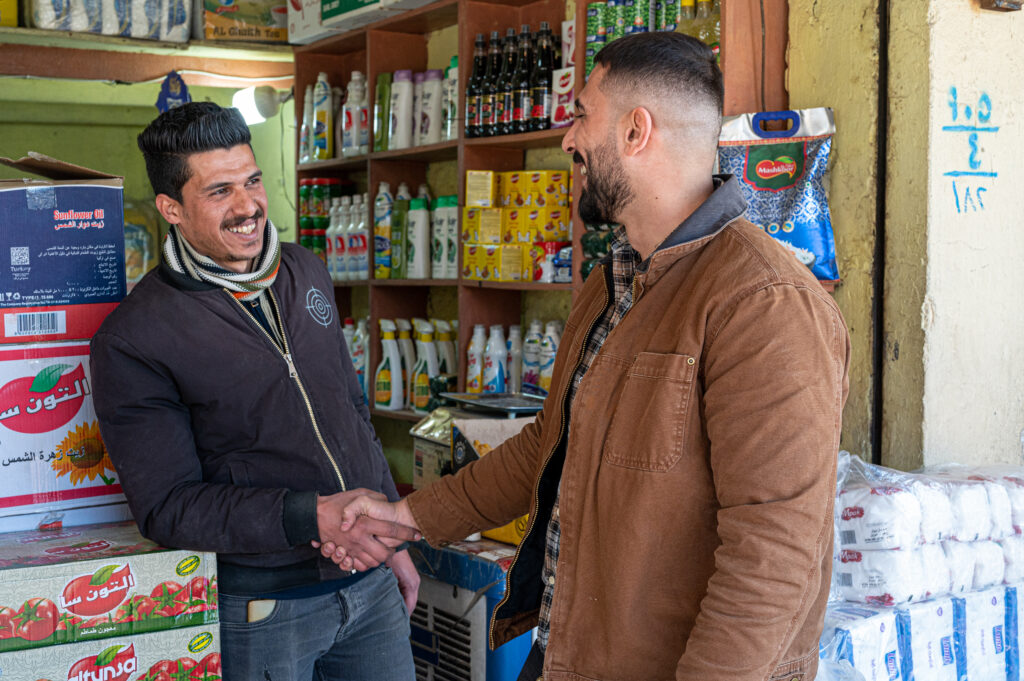
And I did. I stopped carrying the bodies of dead people and caring for the wounded and started something new. I knew that having an income again, a job and a business was the most important thing for the people of Mosul to regain their feet. Not only because of the money. It’s also about self-respect and dignity. A job, a business, is all about working with others, about interaction. About slowly learning to trust others again. That’s what this torn and ruined city needed.
After my time with MSF, I took a new turn and started working with another INGO, Preemptive Love. With them, I got involved in youth employment. Instead of caring for the wounded and the dead, this was more forward-looking. It was about increasing the skills and confidence of young people in a post-war situation. Connecting them with employers and with the outside world. We supported them in their business ambitions and tried to increase their employability.
This young generation, people in their early twenties like me back then, had only known war for at least half of their lives. They had and still have big gaps in their education and are all traumatized but extremely hungry to move on. And they are talented! It takes many skills to survive a decade of war and extremism. Many of them only needed a small amount of investment capital – a few hundred dollars or a thousand – to start running, even flying, as entrepreneurs. Money they could never get from a commercial bank.
“I have learned that showing people the way works much better than putting them on the way.”
What I liked a lot was helping to find a suitable job for women who couldn’t leave the house. After the liberation, women were allowed to go out again, but many families, mostly the very conservative ones, still wanted the daughters and wives to stay inside. A very effective way to support them was to find employment that fit their context and provide proper training and tools. This consisted mostly of digital work, like entering and processing data. All they needed to start was a smartphone, computer, internet connection and basic English and digital work skills.
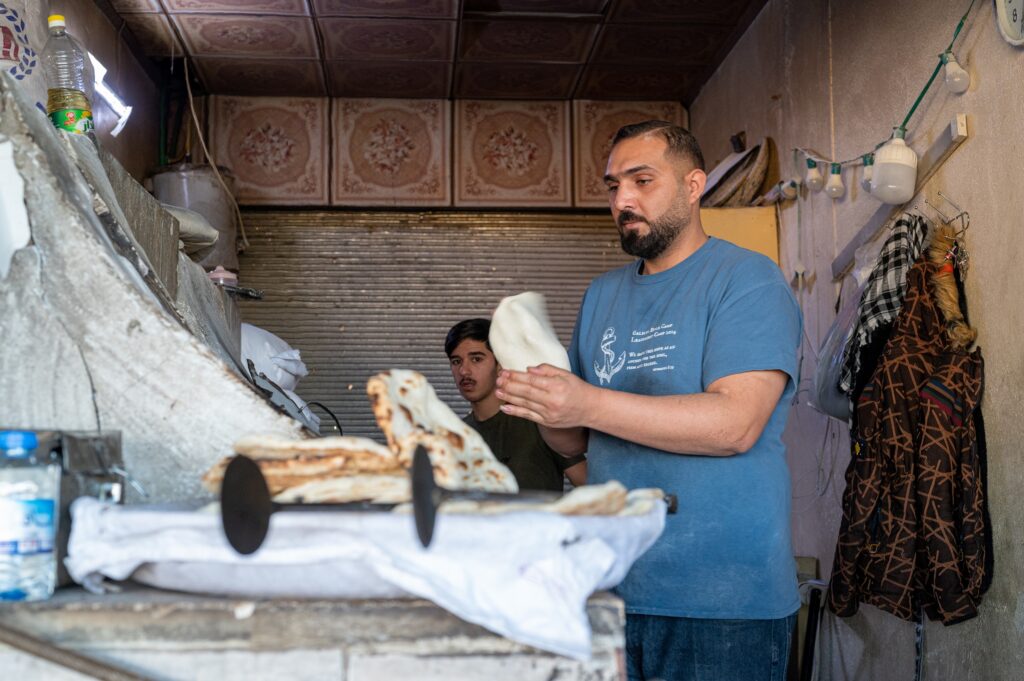
A sister and a brother
However, we also supported women in finding jobs in companies, acting as a matchmaker between job seekers and employers in the Mosul area. Some of them, like this incredibly talented graduate in computer science, Hanine Saif, went on from there to start her own IT training and web design business. That’s a big leap forward! When she applied for Cordaid’s employability support, I was approached by her mother, who told me that her daughter was not allowed to leave the house alone. She asked us to support one of her sons and act as her mahram (chaperone) during the training sessions. Today, she has her own business and is managing it on her own. The brother, by the way, was not nearly as successful as his sister.
I have learned that showing people the way works much better than putting them on the way. For example, except for those extremely poor, most job seekers we worked with had to rent laptops and phones. Providing everything for free in one go doesn’t work. You can create an opportunity for participants, but the option and the decision to take a certain direction must be theirs.
“Having a job not only means food on the table and the means to go to school. It means interaction, beyond the city borders, the governorate, and even national borders.”
Today, more or less five years later, most women we support work from home or outside. They have good positions and work either for themselves or with companies. And their families are fine with that. It shows that a lot has changed. A lot of factors contributed to this change. Most importantly, the situation is more stable. And many refugees have come back with a different mindset after years of living a different life elsewhere. I wouldn’t say that people have become more liberal, but at least they are now more tolerant towards women. However, the relatively simple act of creating job opportunities for women who were locked in their homes has also contributed to changes. In the lives of individuals and families in Mosul.
A man who exemplifies resilience
Over the last five years, I have supported hundreds of young entrepreneurs and job seekers in Mosul, also with Cordaid. Many have inspired me with their stamina, talents, and lust for life despite the challenges of war and utter hardship. One of them is Mohammed Hussain, whom we supported with Cordaid. For me, he exemplifies Mosul’s resilience. He had and still has serious heart issues. Today, at age 25, he owns a five-branch printing and advertising company, employing 15 young Maslawis. He only needed some support to start his business and get there. Before, he used to work for other companies. Hard work, too hard for his medical condition, and little money. With a Cordaid grant, he could rent a printing shop and buy equipment. It was clear from the moment we met him that he had all the entrepreneurial skills, the motivation, and the talents to succeed. He only lacked the money to start. That, plus the fact that he came from a very poor family and had medical problems that required a lot of money, made him a good candidate for Cordaid’s business support. It took him three years to start and grow his business, up to having five branches and providing salaries to fifteen families. As for himself, he got better treatment; his medical condition improved a lot. If you ask me, Mohammed is a dark horse that can win any race.
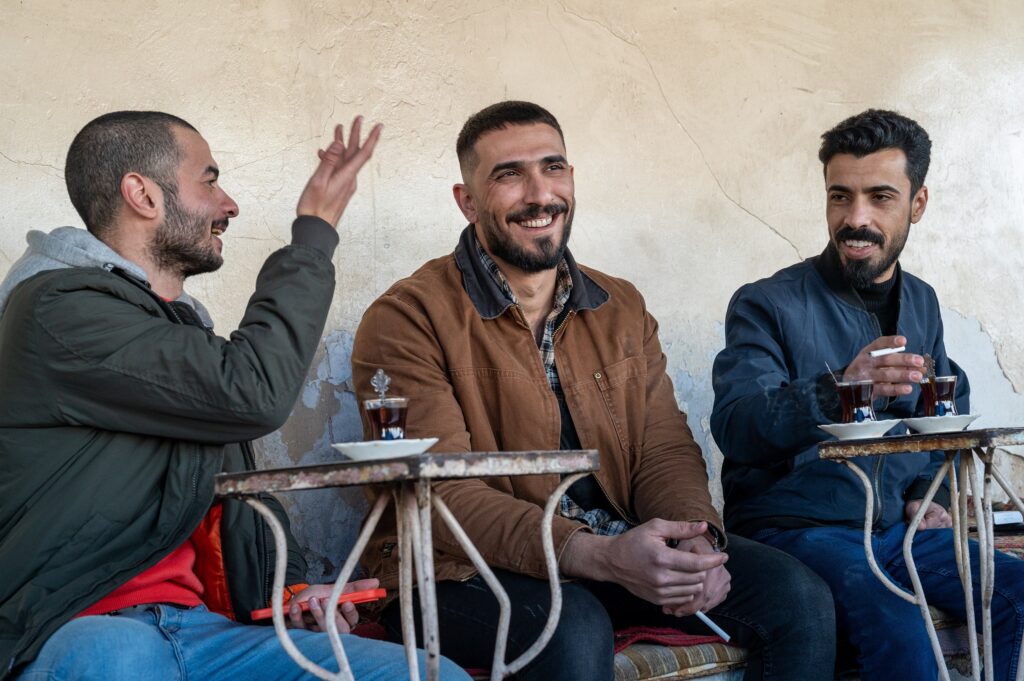
People like Mohammed Hussain are the cornerstone of this city’s infrastructure, not just the mayor and other big shots. He exemplifies this when you talk about rehabilitation and resilience during and after the war, about people rising out of the embers. He leads by example. Supporting him will inspire others to follow his example. It boosts employment, social interaction, confidence, and health. It gives people who went through hell the possibility to breathe. To look forward and to grow. Having a job not only means food on the table and the means to go to school. It means interaction beyond the city borders, the governorate, and even national borders. But it also means people can afford a family picnic in the mountains or another fun outing. Things people have not had for years and years. I would even say that the interaction and physical movement that come with employment gives you a healthier brain. Employment means life. Cordaid’s support for Mohammed Hussain and many other entrepreneurs is so meaningful.
Mosul-made potato chips
Among the entrepreneurs and job seekers we have supported over the years, there are many other inspiring people. Like Dhirar Duraid, a man known in Mosul as ‘the potato chips guy’. He is special to me for many reasons, not least because he makes my favourite potato chips. The brand is called Al Sharq, meaning the East. Ever since I was a kid, I have loved his Mosul-made chips. His market used to be only Mosul. He is a relatively small entrepreneur but introduced new flavours long before the big companies. He is very successful, but he has to overcome a lot. His first factory, in West Mosul, was destroyed during the Iran-Iraq war in the eighties. He rebuilt it. The new factory, also in West Mosul, was again destroyed during the recent liberation battle against ISIS. He rebuilt it again. And recently, he opened a second factory.
When Cordaid started to support him, he had only one factory, was only selling in bulk, mostly in the Mosul area, and his packaging and marketing were poor. But the quality of his chips was and still is unequalled. We knew that he was a goldmine with his product and fighting spirit. But he didn’t know it himself. He could invest in and open a second factory with our financial and training support. In East Mosul this time, not to test his luck too much. It has a fully automatic line for frying, drying, weighing, packaging and sealing the chips. We supported him in improving his marketing skills and preparing for expansion, and we connected him to entrepreneurs all over Iraq, Tukey, Dubai, and other countries. He entered new markets and seriously expanded. Remember that in 2017, after the war with ISIS, he had lost everything. He just had some big pots and pans. Today, he has two factories and five shops and his Al Sharq chips are exported to all corners of Iraq. For Cordaid, the main goal was job creation, which we achieved by supporting Dhirar’s entrepreneurship.
“To ward off dangerous fools, brains and education are at least as important as weapons.”
Before, Dhirar never looked too far ahead and never dreamed too big. In Mosul, why take extra risks if you have already dealt with so many in the past? But with a little push, in a relatively stable setting, people like Dhirar and Mohammed can go much further and support many in their wake.
Better protected against extremism
There is another important side to this kind of business development. When people in a city so damaged by war and violence are more confident, more educated, less poor than before, more aware and more connected to the outside world, it becomes less easy for extremists to take over the city. In 2014, when these few hundred ISIS fighters captured Mosul, people were unaware, didn’t know what was going on, very often uneducated and very poor. It was easy for ISIS to meddle with the minds of the youth because back then, only less than 10 years ago, Mosul’s youth was completely disconnected from the outside world. Meddling with their minds was easy. Getting their support was easy, even before ISIS started their tactics of terror. Today, people, especially the younger generation, have a much clearer understanding of who is good and who is bad, regardless of the religious background of politicians or so-called leaders. Through social media, young people are better informed, better educated, and more connected. They are less easily fooled by sectarian or religious propaganda. They will take it for what it is: stupidity.
Today, with a growing, stronger, and more educated middle class exemplified by all the women who either fight to work from home, break boundaries and find good positions in companies, or have their own businesses like Hanine, by people like Mohammed and Dhirar, Mosul is shielded a lot better against extremism and foolish propaganda than it was before. I am not saying Mosul will not be attacked again. We have been attacked for millennia. But at least we are better prepared.
To ward off dangerous fools, brains and education are at least as important as weapons. In that sense, we have moved forward. But we’re not there yet. Mosul today, as a city, is still full of fear and suspicion because of the trauma, the pain and the grief people have experienced. International investors are still staying far away from Mosul. But, with some support from outside, like from Cordaid, we, Maslawis, are changing and are progressively changing the city from within. Mosul is brimming with talented young people. Smart people with dreams and hopes, ready to move on. Any support to help them realise their potential has a fly-wheel effect and changes lives.
“Our trauma has united us”
Walking around my city today, I feel happy, confident, and even safe. The dark chapters are behind us. They will not come back, not as dark. Many things have changed for the better. We have all suffered too much and learned the hard way not to be tricked by people, media, governments and countries with bad, divide-and-rule intentions. Our collective trauma has united us and made us stronger and more aware than ever. At least most of us. Some people will continue to see or invent enemies until they die. But we can outsmart them simply by believing in ourselves. We’re still these squirrels collecting food for bad winters but are more open-minded. Trust is the key. Long live the people of Mosul; long live the future.”
Text and images: Frank van Lierde / Cordaid